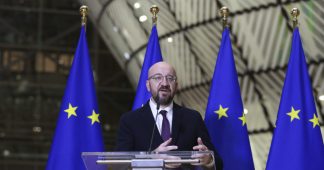Without an agreement on coordinated action, governments will have to borrow money from the markets to cushion the economic fallout from the pandemic.
Even the coronavirus crisis failed to bring EU finance ministers together.
Ministers failed overnight to agree on a coordinated EU strategy that would help protect the bloc’s companies and governments from the economic fallout of the pandemic.
Divisions between factions led by Italy and the Netherlands proved too wide to bridge during the ministers’ online Eurogroup meeting, which lasted over 16 hours. The disagreements mainly emerged over conditions for credit lines from the eurozone’s bailout fund and the idea of pooling debt through so-called corona bonds, officials told POLITICO.
Talks will resume Thursday in a bid to reach a package deal that ministers can present to leaders.
“We came close to a deal but we are not there yet,” tweeted Eurogroup President Mário Ceteno, who chaired the marathon meeting between ministers Wednesday morning. “I suspended the #Eurogroup & continue tomorrow.” He added: “My goal remains: A strong EU safety net against fallout of #COVID19 (to shield workers, firms & countries) & commit to a sizeable recovery plan.” A press conference planned for Wednesday morning has been canceled.
The number of coronavirus cases around the world is approaching 1.5 million, with over 82,000 deaths. Italy has the highest number of fatalities in a single country, with over 17,000. Spain is second with around 14,000 deaths.
But the health crisis threatens to become a financial one. Borders are closed and businesses have had to shut their doors under government orders in a bid to curb the virus’ spread, grinding economies to a halt.
Failing a common strategy, indebted countries like Italy and Spain will have to borrow more money from capital markets to prevent mass bankruptcies and unemployment — threatening a sovereign debt crisis. Governments have already pledged hundreds of billions of euros to prop up their national economies.
Ministers had planned to agree on at least three initiatives that would help governments keep their economies afloat and support a recovery once countries end their lockdowns.
One of those initiatives is the European Commission’s proposed temporary unemployment reinsurance plan, worth €100 billion. The cash pot would support public programs that allow companies to reduce working hours and compensate their employees for any lost income.
The second comes from the European Investment Bank, which has pitched a €200 billion fund that can issue cheap loans to EU companies that are starved of cash.
Finally, there’s the eurozone’s bailout fund, known as the European Stability Mechanism (ESM), from which any country that uses the common currency could draw a credit line worth 2 percent of its economic output — under certain conditions.
All ministers needed to agree on the initiatives before packaging them in a statement to send to country leaders for final approval. That proved impossible, officials said, leaving many disappointed — including Germany’s finance minister, Olaf Scholz.
“In these difficult hours #Europe must stand together closely,” Scholz tweeted after the meeting. “Together with [French Finance Minister Bruno Le Maire], I therefore call on all euro countries not to refuse to resolve these difficult financial issues & to facilitate a good compromise — for all citizens.”
Dividing lines
Scholz told reporters later on Wednesday that the ESM could offer a “precautionary stabilization capacity,” without “any kind of programs” like those implemented in Greece or other eurozone countries that received aid last decade.
Rome was determined during the talks to lighten, or even drop, the ESM credit lines conditions. The Dutch, backed by Austria and Finland, disagreed, officials said.
The Hague is adamant that governments using the credit lines must promise to reserve the money for coronavirus health care and economic costs. States must also commit to ensuring their finances look healthy in the long term.
Another disagreement is over the idea of issuing EU corona bonds to finance the bloc’s recovery. Italy is fighting to include the prospect of issuing joint debt in the Eurogroup statement to leaders. But any suggestion of pooling debt is too much for the Dutch and Germans, who fear they’ll ultimately be left holding the bill if southern countries go broke.
“[The Netherlands] was, is and remains against #Eurobonds, because it increases risks in Europe instead of reducing them,” Dutch Finance Minister Wopke Hoekstra tweeted Wednesday morning. “Apart from [being] unwise, it is also not reasonable … [that the Netherlands] should guarantee the debts that others make. The majority of eurozone countries support this line.”
France had tried to cool any talk of corona bonds by proposing a one-off fund that could raise debt and issue loans to governments. That’s still too controversial for ministers to decide on, the officials said. Leaders will likely have to take the reins on that discussion.
Either way, policymakers need to handle the debate with care to ensure political rhetoric doesn’t sow further discord within the eurozone, some market analysts warned.
“The way in which the EU and the eurozone are perceived to react to the unprecedented emergency of the COVID-19 pandemic can shape attitudes to European integration for decades to come,” Berenberg Bank’s chief economist, Holger Schmieding, said in a statement Wednesday. “Visible solidarity could strengthen the European project, a perceived lack of such solidarity could undermine the political foundations of the project instead.”
Hans von der Burchard contributed reporting.











